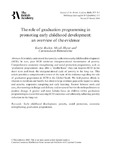The Role of Graduation Programming in Promoting Early Childhood Development: an Overview of the Evidence

Download
Date
2020-03-25Author
Roelen, Keetie
Sherer, Micah
Himmelstine, Carmen-Leon
Metadata
Show full item recordImpact
Abstract
It is widely understood that poverty undermines early childhood development (ECD). In turn, poor ECD reinforces intergenerational transmission of poverty. Comprehensive economic strengthening and social protection programmes, such as ‘graduation programmes’, may offer a ‘double boon’: they can improve ECD in the short term and break the intergenerational cycle of poverty in the long run. This article provides a comprehensive review of the state of the evidence regarding the role of graduation pogrammes in ECD in the Global South. We find positive effects in relation to nutrition and health, but observe large evidence gaps with respect to safety and security, responsive caregiving and early learning. Tension between work and care, short comings in design and delivery and structural barriers form impediments to positive change. A greater and more holistic focus on children within graduation
programming is crucial for securing ECD outcomes and ultimately achieving poverty reduction in the long run.
Citation
Roelen. K., Sherer. M. and Himmelstine. C.L. (2020) 'The Role of Graduation Programming in Promoting Early Childhood Development: an Overview of the Evidence,' Journal of the British Academy, 8(s2), 133–161DOI
10.5871/jba/008s2.133Is part of series
Journal of the British Academy;(s2), 133–161Rights holder
© The author(s) 2020Rights details
http://creativecommons.org/licenses/by/4.0/Collections
- Journal Articles - External [429]
- IDS Research [1671]

